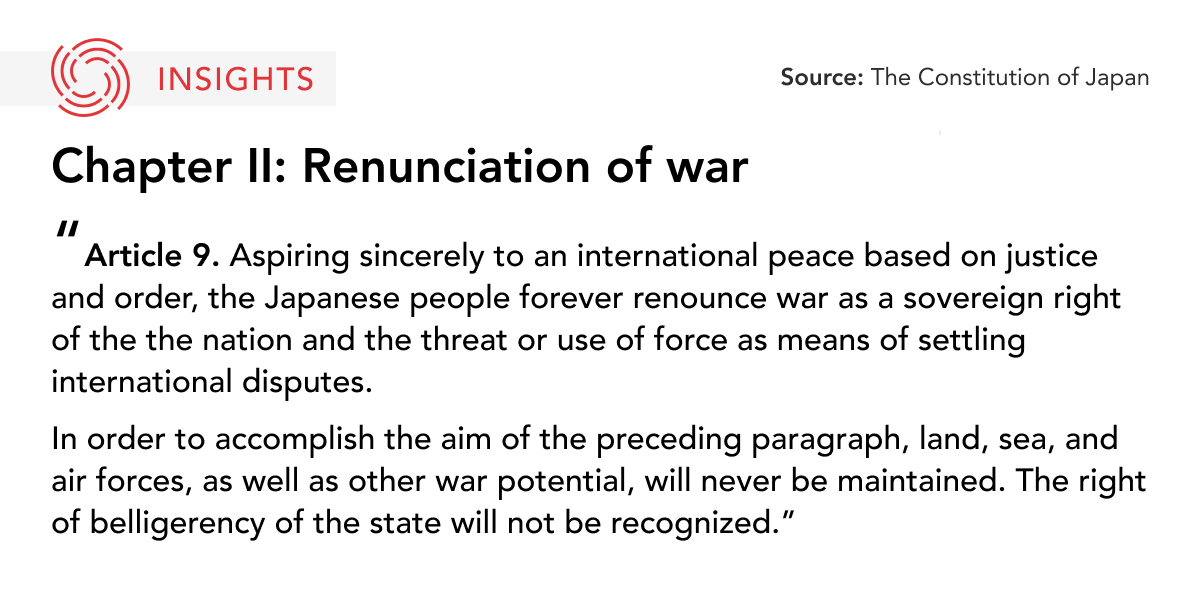The Takeaway
On May 3, Japan “celebrated” the 76th Constitution Memorial Day to commemorate the promulgation of the country's postwar pacifist constitution. Throughout the country, pro-constitutionalists and constitutional revisionists held rallies and meetings to promote their positions on whether or not the constitution should be revised. Opinion polls released on the anniversary indicate that the Japanese public is heavily divided on the issue.
In Brief
Throughout Japan, pro-constitutionalists and constitutional revisionists gathered on May 3 to commemorate the 76th anniversary of the promulgation of the Japanese Constitution. From Hokkaido to Okinawa, both sides held rallies, informational meetings, and parades attended by thousands of people. Central to the discussion was revising the constitution's contentious Article 9, also known as “the pacifist clause,” which renounces Japan’s right to war.

There has been heated political debate about amending Article 9 (and other parts of the constitution) over the last two decades. In 2005, the ruling Liberal Democratic Party (LDP) released draft outlines for constitutional revision, including the deletion of Article 9. The LDP released a full draft constitution in 2012 with several amendments, including a rewrite of Article 9. The rewrite sought to increase Japan’s flexibility in responding to an evolving security environment by creating a National Defense Military, with the prime minister as supreme commander, to secure peace, independence, and safety of the state and the people.
During the pro-revisionist rallies, Prime Minister Kishida Fumio’s administration reiterated the LDP’s four proposed amendments, which include: one, clarification of the Self-Defense Forces (SDF); two, provision for emergency situations; three, enhancement of education, and; four, elimination of joint wards in Japan’s House of Councillors.
However, opinion polls released on May 3 illustrate the reality of a divided Japan. Major Japanese newspapers and media companies including Kyodo News, Mainichi Shimbun, Japan News Network, and NHK conducted separate polls, showcasing heavily divided opinions. Across the polls, 32 to 55 per cent of respondents were in favour of amending Article 9, while 30 to 45 per cent were against.
Implications
The 1946 constitution remains the oldest unamended constitution in the world. The Allied Occupation forces, led by the U.S., wrote the 1946 constitution in one week, and it was promulgated as an “amendment” to the former 1890 Meiji Constitution. During the drafting phase, the Allies anticipated the need for Japan to expand its self-defence capabilities and removed the phrase “even for preserving its own security” for being “unrealistic.”
Article 9 has been “reinterpreted” on many occasions, often coinciding with major international developments, to increase defence capabilities without amending the constitution. Examples include the U.S.-authorized creation of the National Police Reserve during the Korean War, which later became the SDF. More recently, in 2014, the constitution was reinterpreted to include “collective self-defence,” and in 2022, Japan amended three major security documents, granting the country new “counterstrike capabilities.” Such developments have led scholars and critics to claim Japan’s gradual militarization as a “de facto denial of Article 9.”
The recent rallies show a divide among the Japanese public. The public must balance rising regional security concerns with the notion of pacifism embedded into the Japanese psyche since the end of the Second World War. Politically, different parties have expressed diverging opinions regarding amending Article 9. In April, even the ruling LDP’s junior coalition partner, the Komeito, opposed the LDP’s proposals for the first time over fears that the revision could limitlessly expand the scope of SDF activities.
Kishida’s message during the Constitution Memorial Day points towards continuity in the LDP’s position from the times of former prime minister Koizumi Junichiro and the late prime minister Abe Shinzo. The reaffirmation of the LDP’s efforts to amend the constitution, regardless of the prime minister’s faction indicates that such debates will continue indefinitely.
What's Next
-
Constitutional revisions beyond Article 9
Article 9 is the most hotly debated aspect of constitutional revision proposals, often overshadowing debate about revising other parts of the constitution. In addition to the four main proposals from the LDP, opposition parties are also proposing changes, such as acknowledging same-sex marriage or increasing women’s rights by removing the same-surname system. Future negotiations for constitutional amendments could include compromises by political parties to mutually exchange support to realize change.
-
Feasibility of amending the constitution
Constitutional reform in Japan requires a two-thirds majority in both houses of the National Diet followed by a nationwide referendum in which a simple majority is required. The ruling LDP does not hold a two-thirds majority in either house even with the support of its junior coalition partner, the Komeito. The LDP will need to garner support from opposition parties and the public to revise any aspect of the constitution.
- Produced by CAST’s Northeast Asia team: Dr. Scott Harrison (Senior Program Manager); Momo Sakudo (Analyst); Tae Yeon Eom (Analyst); Sue Jeong (Analyst).




